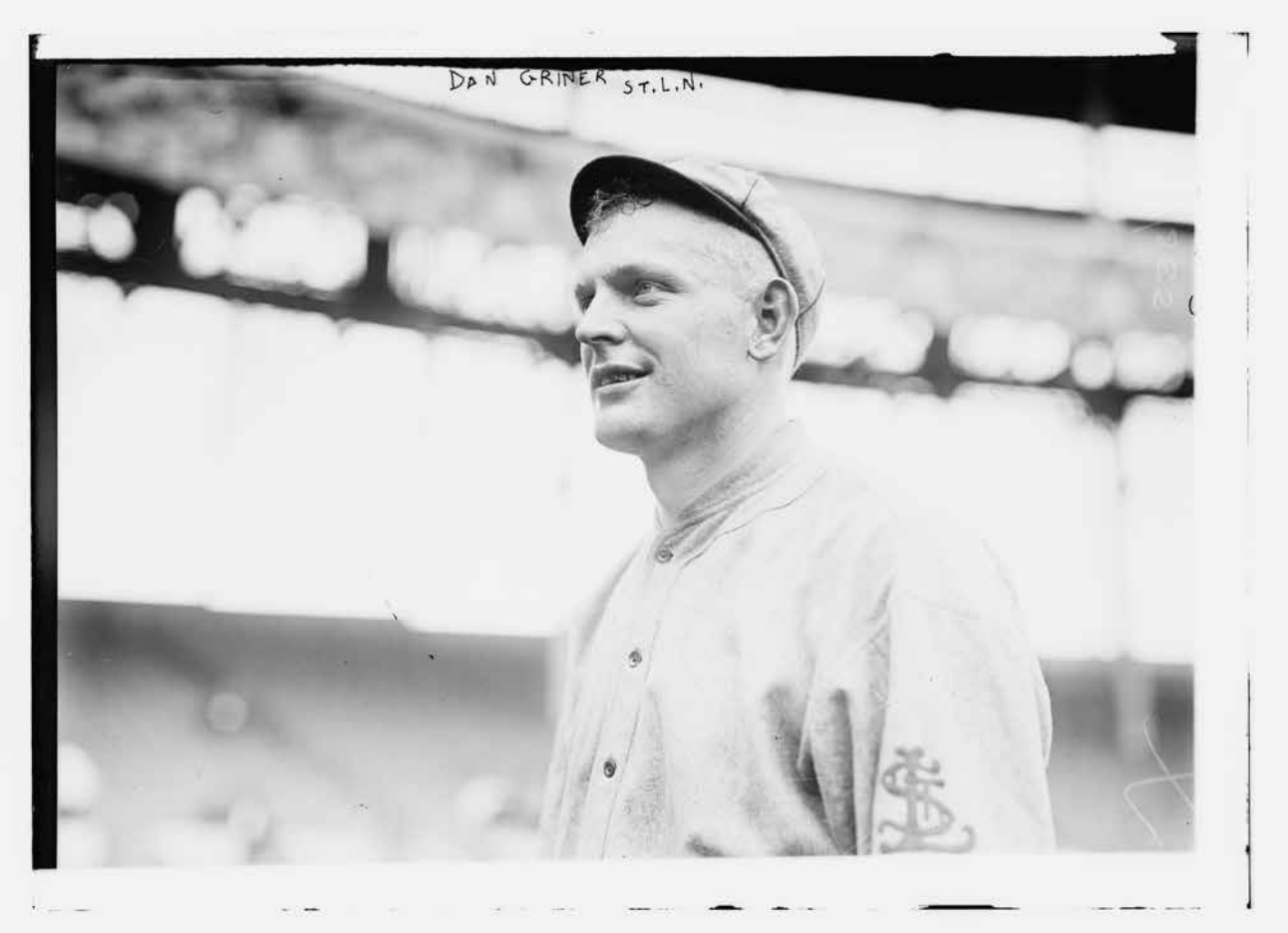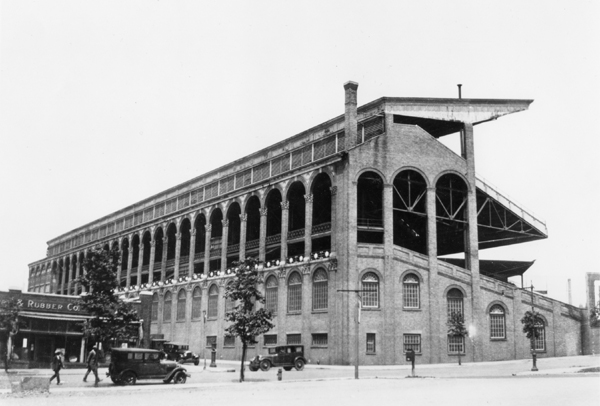May 6, 1918: Brooklyn’s Dan Griner loses no-hitter with two outs in the ninth
Exterior view of Ebbets Field’s iconic brick and arches, circa 1918. Outfield bleachers were constructed in 1926. (Photo: SABR-Rucker Archive)
Dan Griner‘s last major-league win was his best one: he came within one out of pitching a no-hitter.
The son of a Confederate soldier, Griner joined the St. Louis Cardinals in August 1912, his first professional season, making the jump from the Class D Appalachian League. In his first full season in the majors, 1913, he led major-league pitchers in losses and runs allowed. After he also posted losing records in 1914 and 1915 – and got into fistfights with three teammates in 1914, sending one to the hospital – the Cardinals let him go early in the 1916 season. But after he spent two seasons with St. Paul of the American Association, he got another shot at the big leagues in 1918 with the Brooklyn Robins, who were hard up for pitching after losing two starters to the military and World War I during the offseason.1
However, the Robins didn’t seem so hard up for pitching as to actually use Griner. He worked only seven innings in the team’s first 15 games, all in relief and all in losses. His light workload may have been in part because of an ankle injury he suffered in spring training.2 Then on May 6, Brooklyn manager Wilbert Robinson gave Griner the ball to face the Philadelphia Phillies at Ebbets Field. He was still so little known in Brooklyn that the New York Times story about the game referred to him as “Dave” Griner.3
“It is not knocking to say that Griner had not made any sort of a favorable impression up to yesterday,” said the account of the game in the Brooklyn Daily Eagle, “and the 1,200 or so fans present groaned aloud when he was announced.”4
The Phillies had started the season with seven wins in their first nine games, including a three-game sweep of Brooklyn in Philadelphia in which they scored 19 runs, before their bats went cold. They entered the May 6 game with a five-game losing streak and had been shut out in four of them, and their bats stayed cold against Griner, as he retired the side in order in each of the first four innings, striking out three.
Meanwhile the Robins put up two runs in the first inning against Philadelphia’s Joe Oeschger. Ivy Olson led off with a Texas League single behind second base, and Ollie O’Mara followed with a similar hit to the same spot, putting runners on first and second. Jake Daubert laid down a bunt, but Phillies first baseman Fred Luderus dropped Oeschger’s throw. “The bobble so upset Luderus that he clutched the ball while Olson ran home,” according to the Philadelphia Inquirer.5 O’Mara went to third on the play and scored when cleanup hitter Hy Myers singled to right. Daubert was thrown out by Gavvy Cravath while trying to advance to third. Myers took second on the throw and advanced to third when Jimmy Johnston grounded out to short. Jim Hickman followed with a walk and stole second, but Oeschger got out of the inning by retiring Ray Schmandt on a groundball to third.
The Phillies finally put a man on base with one out in the fifth inning, when Luderus reached on an error by second baseman Schmandt, who fumbled a groundball. Irish Meusel walked, bringing Harry Pearce to the plate.
At that point Brooklyn catcher Mack Wheat (the younger brother of his Hall of Fame teammate Zack Wheat) made the defensive play of the game. “Pearce raised a foul which dropped a few feet from the screen,” Al C. Palma wrote in the Brooklyn Citizen. “Wheat misjudged the ball and overran it. As it came down he reached for it. The ball hit his glove and he toppled over. Just as the sphere was hopping out, Mack made another lunge and hugged it tight.”6
The runners advanced to second and third after the catch – Wheat nearly threw out Luderus trying to take third, but third baseman O’Mara mishandled the throw – and Griner walked Bert Adams intentionally to load the bases for the pitcher Oeschger, who was retired on a foul pop to Daubert at first to end the inning.
Philadelphia went down in order in the sixth and seventh. Pearce led off the eighth with an easy fly ball to right that Hickman lost in the sun and dropped for an error, Pearce taking second. Possum Whitted, batting for Adams, hit a line drive to Daubert, who caught it and then doubled off Pearce. Oeschger struck out, and Griner took a no-hitter into the ninth. The score was still 2-0, as the Robins had managed just two hits, both singles, after the first inning. Brooklyn did miss out on a scoring opportunity in the bottom of the eighth when, with one out, Olson singled, stole second, and moved to third on a passed ball. But O’Mara popped out and Daubert flied out to end the inning.
Mike Fitzgerald, leading off the ninth, was retired on a fly ball to left. Dave Bancroft then worked the count to 3-and-2. “There was no question but that the next ball delivered by Griner was over the plate,” Palma wrote. “However, [umpire Bill] Klem called it a ball and the assumption is that he thought it too low.”7
Milt Stock followed with a groundball to short. Olson threw to Schmandt to get the second out of the inning, but when Bancroft went into second base standing up, Schmandt was unable to make the relay to first. While some accounts opined that Bancroft prevented a game-ending double play, Palma was not convinced the Robins would have gotten the out at first because the groundball was a slow one. In any event, if strike three had been called on Bancroft, the game would have been over.
But it was not, and Cravath, the Phillies’ slugging cleanup hitter (he had already led the National League in home runs four times and would do so twice more), went to the plate as the tying run. He “swung wildly at the first ball pitched to him and the sphere sped on a line over second base,” according to the New York Tribune’s Charles A. Taylor, with Stock taking third on the single.8
Griner had lost his no-hitter, but he still had a game to win, with the tying run on base. The next batter, Luderus, swung at the first pitch and hit a groundball to O’Mara at third, who threw to Schmandt at second, retiring pinch-runner Patsy McGaffigan to end the game and give Griner his seventh major-league shutout. There would not be a no-hitter at Ebbets Field until Dazzy Vance threw one against the Phillies in 1925.
Griner’s pitching in the game was described in the Brooklyn Daily Eagle: “His principal assets were a slow ball and a fast drop. He had both working to perfection, and the heady change of pace he put over was the principal cause of the Phillies’ collapse. Daniel mixed in other assorted shoots here and there, but the teaser and the quick drop were the tricks that stood the Phils on their heads.”9
The one-hitter was the second Griner pitched in the major leagues. He lost the first one. On July 30, 1914, pitching for the Cardinals, Griner allowed a leadoff single to Les Mann in the third inning; Mann came around to score on a sacrifice, a groundout and an error. The game was tied 1-1 going into the bottom of the ninth, when Braves pitcher Lefty Tyler reached on an error to lead off the inning, moved to second on a sacrifice, took third on a groundout, and scored when Cardinals third baseman Zinn Beck fumbled Rabbit Maranville‘s grounder.10
Griner went on to start five more games for Brooklyn in May 1918, losing them all. In June, facing the prospect of being drafted by the military, he left the team to work at a munitions plant and pitched for the plant’s team in a shipyard league. He returned to Organized Baseball in 1919, pitched for St. Paul’s American Association champions in 1919 and 1920, and kicked around the minors as a pitcher and sometime manager through 1924.
Griner finished his major-league career with a record of 28-55 – but he was just one out away from a place in the history books.
SOURCES
Gregory H. Wolf’s biography of Griner in the SABR Baseball Biography Project is the definitive source for biographical information on Griner. Game accounts were accessed via Newspapers.com.
NOTES
1 Gregory H. Wolf, “Dan Griner,” Society for American Baseball Research Baseball Biography Project, https://SABR.org/bioproj/person/f05dd83a.
2 “Robby Looks for Dodgers to Finish in the First Division,” Brooklyn Daily Times, May 7, 1918: 8.
3 “Phillies at Mercy of Griner’s Shoots,” New York Times, May 7, 1918: 10.
4 Rice, “Superbas Off on Long Tour After Cleaning Up Phillies,” Brooklyn Daily Eagle, May 7, 1918: 20. (Rice was the sportswriter’s byline.)
5 “Cravath Spoiled Dan Griner’s Dream,” Philadelphia Inquirer, May 7, 1918: 12.
6 Al C. Palma, “One Uncontrolled Pitch Beat Griner Out of No-Hit Game,” Brooklyn Citizen, May 7, 1918: 5.
7 Al C. Palma, “One Uncontrolled Pitch Beat Griner Out of No-Hit Game.”
8 Charles A. Taylor, “Cactus Sticks Dan Griner for Lone Hit in Shut-Out,” New York Tribune, May 7, 1918: 12. Several newspaper accounts of the game indicated that, under the apparent baseball etiquette of the time, Cravath should not have tried to get a hit with two out in the ninth inning of a no-hitter. “Gavvy Cravath, a player with a record that is spotless, with a reputation as a sportsman and a gentleman, brought shame upon himself by violating the first rule of baseball ethics. He made a base hit when he should not have done so.” Hugh S. Fullerton, “Different Complexion on American League Race,” New York Evening World, May 7, 1918: 13. “When a twirler has gone the route without having a hit charged against him and the last man comes to bat he does not exert himself in trying to spoil the proudest record a pitcher may hope to have in baseball.” “Cravath Robs Griner of a No-Hit Game,” Brooklyn Daily Standard Union, May 7, 1918: 10. In that same newspaper: “Bancroft asked Cravath when he walked back to the bench with his chin resting on his chest, ‘Why did you do it?’ [Cravath] replied, ‘I swung wildly. The ball hit the bat. It’s too bad to spoil that kid’s no-hit game.’” “Notes of the Game,” Brooklyn Daily Standard Union, May 7, 1918: 10.
9 Rice, “Superbas Off on Long Tour After Cleaning Up Phillies.”
10 Glen L. Wallar, “Griner, Beaten, Gives One Hit,” St. Louis Daily Globe-Democrat, July 31, 1914: 10.
Additional Stats
Brooklyn Robins 2
Philadelphia Phillies 1
Ebbets Field
Brooklyn, NY
Box Score + PBP:
Corrections? Additions?
If you can help us improve this game story, contact us.



